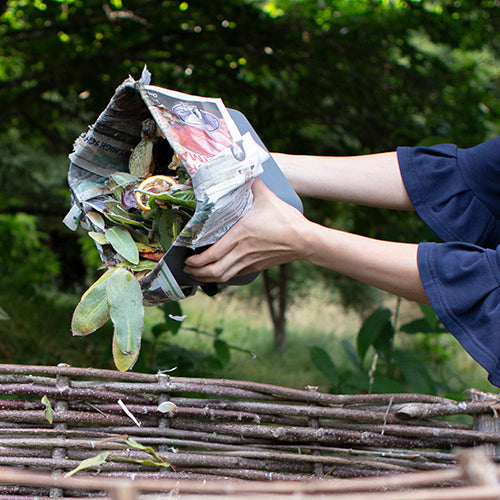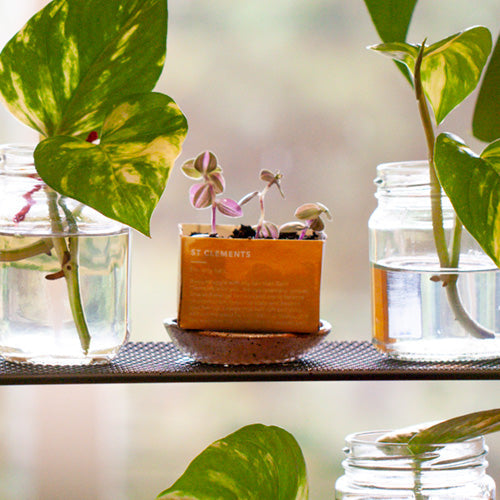If you live in an apartment, space is your biggest consideration. It can feel like a battle, you can’t just take home that massive thrift shop vase that you eyeballed, and something small like a countertop compost caddy can take up precious kitchen counter space.
But no matter how much of a space budget you are on, there is a compost solution that can work for you.
If you are worried about things like odors and insects, don’t be! Composting indoors in a small space has evolved and there are so many options available. From worm farms to bokashi, no matter what your lifestyle or living arrangement, it is now quite easy to make composting work for you. 
Why sending food to landfill is the real stinker
When we throw food and kitchen waste into the trash, it goes along to landfill. But that’s okay because it’s not plastic and will decompose naturally, right? Wrong.
In fact, 10% of greenhouse gas emissions come directly from food and organic waste we send to landfill. That is almost double the amount of all emissions from cars in Europe and the US combined!
The benefits of using compost
Compost is a natural soil fertilizer that can assist with soil erosion, water retention, and soil aeration. It can also help to protect plants from pests and diseases and is brimming with good bacteria and fungi that create the perfect environment for plants to thrive.
If compost wasn’t cool enough, it is now also being used as a source of renewable energy, converting leftover food to biogas.
The best part is that you can start making your own at home with just a container on your counter! You don’t need to send any food waste to landfill.
Modern composting options
Your idea of home composting may stem from images of steaming piles of apple cores, leaves and grass clippings spilling out of old fruit bins in romantic scenes from garden magazines.
Or perhaps it was your job to take the tabletop kitchen scrap box out to the compost heap at the end of the garden which seemed like forever to get to.
Don’t let your ideas of what composting is deter you, composting has evolved to accommodate small space living in the best ways. It is no longer just something for farmers or gardeners.
What is composting?
Composting is simply the recycling of organic household waste. Turning things like kitchen scraps, grass clippings, Ethique packaging tubes and even lint from your vacuum cleaner, into nutrient-rich compost.
Apartment compost options
If you live in a small space, you are probably worried about smell. But unlike a stinky trash can, a compost bin doesn’t actually smell at all if done properly. If anything, the scent from a compost bin is slightly earthy and won’t stink up your home.
Bokashi composting
The Japanese method of bokashi literally pickles your left-over food scraps and organic waste inside a container. The process doesn’t turn it into the brown crumbly compost, instead it ferments it and creates a worm tea that can be used as a fertilizer on plants and the solid waste can be buried in your garden or pots in just 2 weeks. How cool is that?- Pick up a starter kit, or just grab a container with a tight lid
- Add some bokashi bran – you can even make your own!
- Follow the instructions to get started and let it do its thing.
Worm farms
Vermicompost or worm farms have experienced a surge in popularity as they’re easy to set up and manage.
You need:
- A worm bin
- Worms
- Bedding for the bin such as shredded cardboard, leaves, soil or paper
- Food scraps for the worms to eat
- A container for collecting the worm tea.
How to use compost?
Compost can be added as a regular fertilizer feed to any plant, tree or vegetable garden and your plants will love your home-made compost way more than any factory-made fertilizer.
Worm tea is like a superhero for your garden! A natural pest repellent: vegetables and flowers love it, and it can revive almost any neglected house plant.
What to do with your compost if you don’t have access to a garden
Even if you don’t have a garden and are not that interested in plants, there are still lots of ways your compost can be useful.
Find someone who could use your compost for good
Perhaps you have a neighbor or a friend with a garden who would gleefully appreciate your garden scraps, worm team or pickled bokashi compost.
Community gardens, food forest projects and share waste initiatives are great ways to recycle your organic waste and reduce the impact to the environment.
Lots of local community garden projects will take your food compost like kitchen scraps and vegetable peelings. Just make sure to check with them what you can and can’t add to their compost. You can either take your bin directly to them or pop it into a bigger bin or bucket for easy transportation.
The key here is definitely to choose something local.
The power of compost
Reducing our collective food waste and ‘turning off the tap’ at the source is going to be a game-changer for our environment.
We don’t need to throw any food or organic waste into the trash. Even if we can’t use it, somebody near us can. It is up to us to make the effort and make small changes to the way we live, store food and be mindful of how we dispose of what we use.
Do you compost successfully in an apartment? We would love to share your small space compost hacks! Email us at hello@ethique.com with your ideas.

 Impact
Impact Blog
Blog Store Locator
Store Locator


